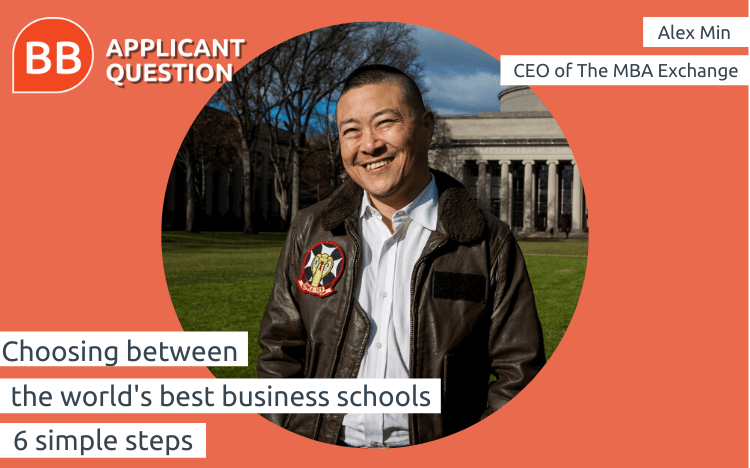How do I choose between the world's best business schools when applying to my MBA?
Dear BusinessBecause,
I know that I want to do an MBA, but I'm unsure where. There are so many business schools to choose from that it's difficult to know where to start!
What advice would you give for building a list of schools to target?
This week's Applicant Question was submitted by an anonymous reader.
The Answer
This week's Applicant Question is answered by Alex Min, CEO of The MBA Exchange.
There’s no shortage of alternatives when choosing business schools for your target list.
The sheer number of MBA programs is staggering. Drawing from our experience advising more than 5,000 MBA applicants over the past three decades, The MBA Exchange offers a way to break through the clutter and confusion by answering six key questions.
1. What are my career objectives?
While it’s difficult to articulate exactly what you want to do 15 to 20 years from today, most individuals can identify one scenario that would be satisfying and attainable with an MBA education.
The reality is that you’re going to need to frame a career objective for your upcoming applications and interviews, so why not get a head start?
Having a sense of what you’ll be doing in the future provides a foundation for targeting some business schools and disregarding others.
2. How can the school help me succeed?
Next, you can assess which MBA programs offer the most relevant and valuable support for your goal.
For example, say you envision becoming chief marketing officer at a consumer goods corporation.
Including business schools such as Northwestern Kellogg and Duke Fuqua makes excellent sense.
Or, if you plan to become a Wall Street investment banker, schools such as Wharton, MIT Sloan, and Chicago Booth merit consideration.
To evaluate whether an MBA program aligns with your likely future, read the annual employment report to confirm whether a significant number of recent grads entered your desired industry.
Then, take a hard look at the elective curriculum, faculty profiles, campus clubs, and annual conferences to confirm the fit.
3. Who has attended and why did they do so?
Beyond the 'rockstar' alumni featured on a school’s website, it’s important to get an idea of typical individuals who attended the school.
You can do this on a macro level by searching LinkedIn for alumni working in your preferred industry.
A more insightful way to evaluate current and past attendees is to engage with them directly.
If you don’t already know such individuals, tap your personal and professional networks for an introduction.
Otherwise, approach officers of student clubs and alumni chapters through their websites.
You’ll find most to be receptive and eager to help you learn about their alma mater. At the same time, you’ll get a feel for the intellect and personality of people who may become lifelong friends and allies.
4. Why should the school admit me?
Identifying MBA programs that serve your priorities is essential, but you also need to consider the likelihood of being accepted there.
For starters, compare your undergraduate GPA and standardized-test score with the middle 80% of recent admits.
If your stats are within this range, you’ll have a reasonable chance for success.
However, given admission rates as low as 7% to 25% at top-tier business schools, being statistically qualified is not enough.
Factors such as professional impact, non-work leadership, diversity status, cross-cultural awareness, personal history, and interview skills will help determine the outcome of your admission campaign.
So, it’s beneficial to get an objective, expert evaluation of your overall competitiveness from a professional admissions consultant before including a school on your target list.
5. Where else should I apply?
Once you evaluate and rank MBA programs according to fit with your candidacy, it’s wise to group them according to probability of your admission.
A practical approach is to categorize schools as either 'Stretch', 'Possible', or 'Likely.'
Then, just as you would allocate financial resources to various investment vehicles according to risk and reward, allocate your MBA applications by category.
For some candidates, targeting any program other than 'Stretch' is not motivating. For other individuals, the value proposition at 'Likely' programs is still compelling.
6. If this is the only school to admit me, would I attend?
This challenging question is the final one when deciding whether to include an MBA program on your target list.
However, by the time you address it, you will have gained a solid understanding of each school based on your answers to the previous questions.
Dig deep and predict how you’ll feel if and when accepted.Then, finalize your list and launch your MBA admissions campaign with focus, clarity, and confidence.
Ask an Admissions Expert a Question

Next week, you'll have the chance to ask Maria Carulli, head of admissions for the International Executive Masters at MIP Politecnico di Milano, anything you like about getting into business school.
Prior to her current role, Maria was in charge of recruitment for Europe, within the international marketing and sales team.
In this capacity, she also worked with careers services for MIP's full-time MBA.
Got a question you'd love Maria to answer? Submit your question
Student Reviews
Duke University Fuqua School of Business
RECAPTHA :
05
61
a4
53









